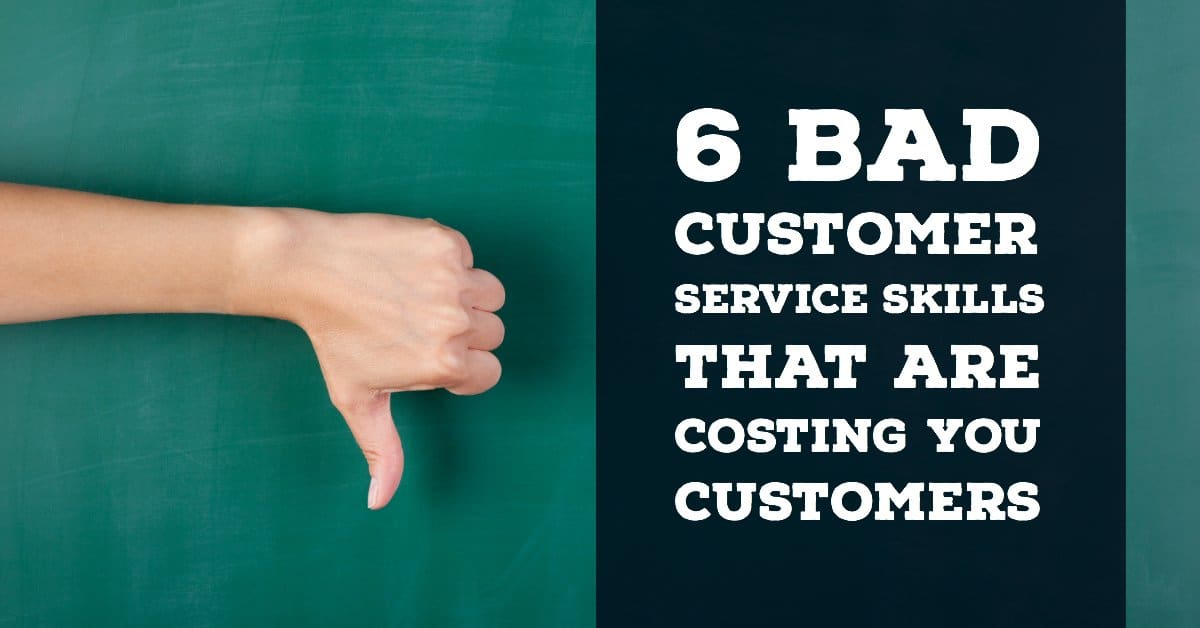
Are you looking to improve your customer service skills?
Customer service is a huge part of earning and maintaining the business of your customers, but it is often overlooked.
You may be losing customers due to poor customer service skills, but how are you supposed to make improvements when there’s no time for a training session?
You shouldn’t be afraid of making improvements to your business’s customer service skills because you think training your employees will take too much time.
With our list of 6 bad customer service skills, you’ll be able to recognize your business’s weaknesses and make improvements today!
Table of Contents
ToggleImprove Your Customer Service Skills By Fixing These 6 Mistakes
You don’t have to completely redo your business model to improve your customer service skills.
When it comes to good customer service skills, if you know how to recognize your business’s weaknesses, you can easily make improvements.
1. Mumbling
If a customer has a question, they’re going to want to hear the answer.
An unclear response from an employee will cause frustration and a lack of clarity.
Imagine this: a customer at a shop has a question about the price of an item. When he asks an employee for help, he cannot make out the response. The volume is too low, the words are strong together, and the voice is practically a whisper by the end of the sentence.
This customer could ask for the employee to repeat herself, but he will most likely receive the same frustrating response the second time.
Now the customer still doesn’t know the price of the item. Instead of making a purchase, he leaves the shop empty-handed.
Replace Mumbling With Excellent Customer Service Skills
It’s easy not to mumble, just speak up. As far as customer service skills go, a discernable speaking voice goes a long way.
Speak in a clear slow voice at a volume customers will understand. Enunciate your words clearly, and don’t lower your volume at the end of your sentences.
A clear speaking voice will tell customers that you are confident in the information you give them.


They’ll trust what you say and be more likely to go through with a sale.
2. Not Smiling
You could have all the answers.
You could know everything there is to know about your business, but if your delivery is poor, your customers will still be unsatisfied with your customer service skills.
If you have a frown or a passive face while helping a customer, they may feel like it is bothersome to have asked for help.
Improve Your Customer Service Skills with a Smile
One easy and excellent customer service skill is to simply smile. It assures your customers that you are happy to help them. It says that you care about them and want to help.
If you smile and greet customers warmly, they’ll see you as trustworthy and be more likely to seek your help.


Once you are able to assist customers, there’s a better chance that they’ll make a purchase.
3. Hiding Lack of Knowledge
It can be embarrassing to feel like you don’t have the answer to a customer’s question.
You may attempt to hide this fact by avoiding the question or simply making something up.
However, this won’t help your customer at all. Remember: you are there to assist your customers, not boost your own confidence.
False information can drive customers away or create a larger problem in the long-run.
You may feel like it’s your job to know everything, but when you don’t, hiding your lack of knowledge appears dishonest and unprofessional.
Be Honest
You can’t know the answers to all the questions all the time. Your customers will understand this.
When you don’t know the answer to a question, let your customer know that you don’t know the answer at the moment, but you will find out as soon as possible.
Outline your plan to find the answer, and tell your customer how you plan to relay the information to them. Then get them the answer as soon as possible.
Your customer will be assured that they have accurate information. They’ll appreciate the lengths you went to to get it to them as well as your customer service skills.
4. Passing Off Responsibility
Just like hiding it when you don’t know the answer to a question, not taking responsibility for a mistake can be off-putting to a customer.
It shows a lack of credibility.
Picture this: a customer walks into a clothing store and sees a pile of sweaters left unfolded on a table. If she reports the state of the sweaters to you and you respond, “Oh, Greg was supposed to fold those,” you appear immature and unprofessional.
Customers won’t be impressed with your customer service skills if you pass off responsibilities.
Take Charge of the Situation with Good Customer Service Skills
Even if the error wasn’t your fault, you can still take responsibility and handle it yourself.


When it comes to customer service skills, you don’t want to say or do anything that reflects poorly on the business, so don’t go telling all your customers that Greg forgot to fold the sweaters.
Next time a customer points out something like this, respond with a simple, “Thank you for letting me know, I’ll take care of it right away.”
Customers will appreciate your polite nature as well as your willingness to take charge of the situation.
5. Speaking Poorly About Your Job
You may not love where you work, but your customers don’t need to know that.
Speaking poorly about your job is one of the most disconcerting ways to drive customers away.
A bad attitude at work can make itself known in many different ways. You may express boredom to a customer or say how excited you are for your shift to end. Maybe you speak poorly about your boss or your coworkers. Either way, it reflects poorly on you and your business.
Customers will see this bad attitude as your lack of confidence in the business. Why should they have confidence in a business when its employees don’t?
Display a Positive Attitude
A positive attitude about your job and your company is a customer service skill that goes a long way.
Maintain a sunny demeanor when working with customers. This will show them that you are proud of the job you have and the company you work for.
Even when a customer expresses frustration, empathize with them by showing that you understand what they are feeling, but don’t go so far as trash talking your own company.
By remaining positive about your job, customers will begin to feel more positive as well.


6. Bad Posture
Maybe you slouch. Maybe you lean against furniture. Perhaps you scuff your feet when you walk.
We get it. It’s easy to feel tired, especially when you’ve been working since 8 am. However, as tired as you may be, you should always maintain a professional appearance.
If you slouch or have bad posture while speaking with a customer, they may think that you would rather not be speaking with them.
It appears as if you don’t care about your job and can’t be bothered to put in any work.
Customers want to shop and do business where employees are happy to help, not too bothered to care.
Show You are Proud
When you’re at work, consider yourself a walking, talking advertisement for your business.
You can display your pride and confidence in your business simply by standing up straight.
You’ll appear more professional, and customers will see you as someone ready and willing to help.
Improve Your Customer Service Skills Today!
By recognizing where your customer service skills may be lacking, you can easily improve the skills of yourself and your employees.
Don’t wait to make adjustments. You can easily improve your customer service skills and better your business today with the adjustments listed above.
Are you interested in learning more about customer service? Check out our post, 8 Best Customer Service Examples to Inspire Your Team.










